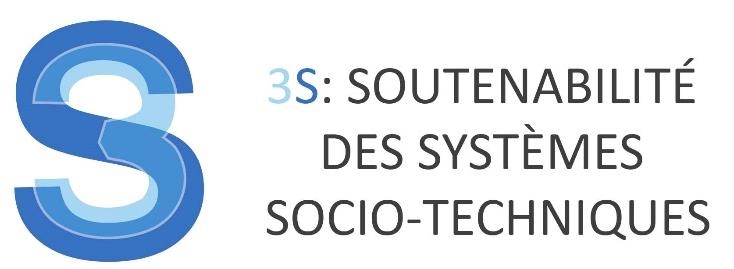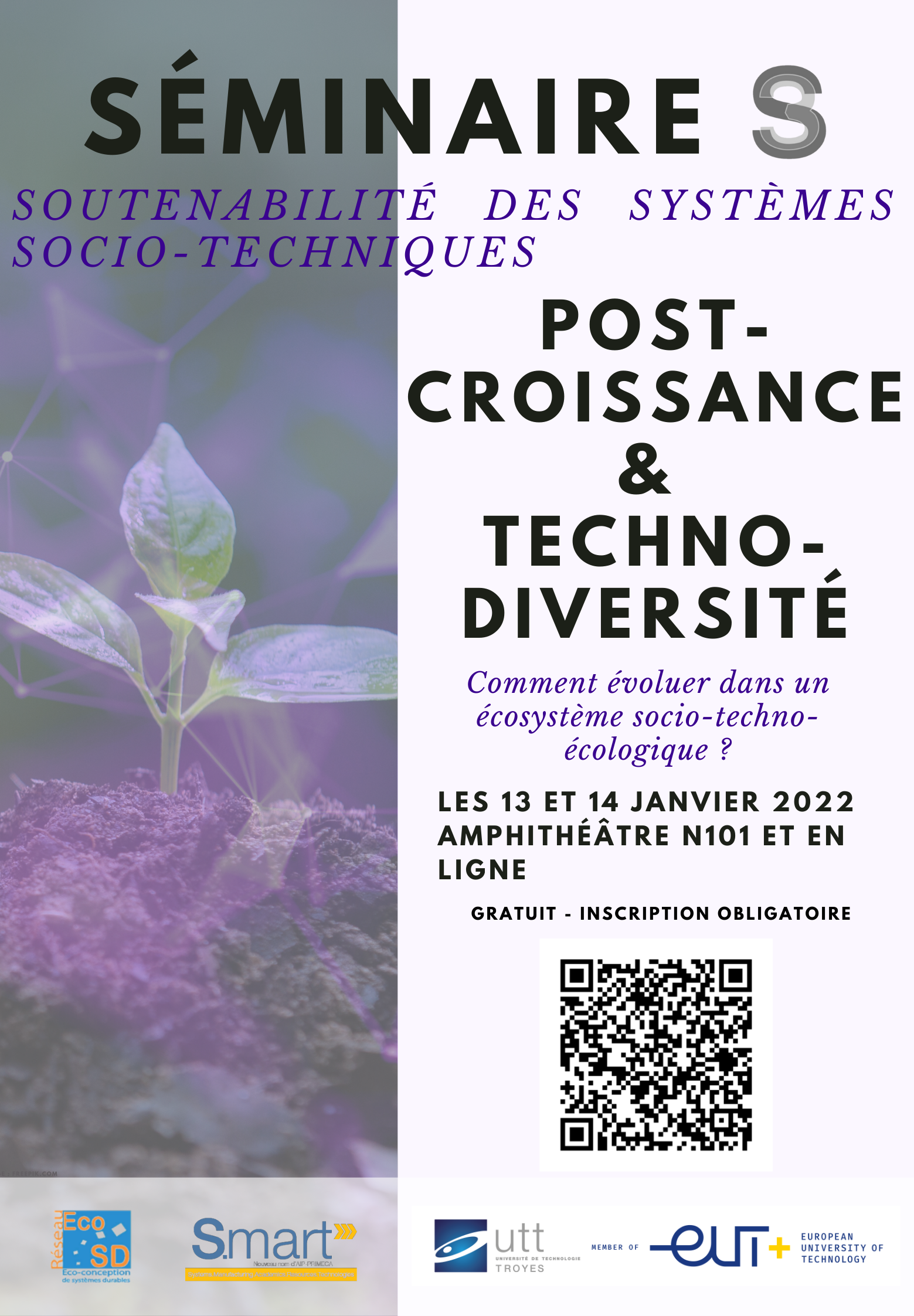In the same section
Seminar 3S
Originally in 2019, the 3S seminar was created to communicate on transition-related topics to UTT students and staff, and more particularly to Master's students in the Engineering and Management of the Environment and Sustainable Development (IMEDD) programme, UTT doctoral students following the Transition module of the Sociotechnical Systems (SST) speciality at UTT and doctoral students at GIS S.mart and the ECOSD network.
The ambition of today's 3S seminar is to widen the number of participants (local actors, companies, associations, etc.). During the last editions, the different speakers have succeeded one another to lead the conferences, workshops and round tables.
5ème édition : Les Communs, 27 et 28 mars 2023 à l’Université de Technologie de Troyes et en ligne
- Présentation
-
La crise socio-écologique que nous connaissons est une première dans l'histoire de l’humanité. Jamais une unique espèce n’a été en mesure de modifier l'équilibre thermodynamique de l’ensemble du globe. Comment en sommesnous arrivés là ? Les imaginaires capitalistes sur lesquels se sont construites nos sociétés modernes ont entraîné l’accaparement des richesses mondiales par une infime partie de la population au prix de l’extraction effrénée des ressources naturelles dont nous tendons à épuiser les stocks accessibles. Cependant, nous avons oublié que nous ne faisions partie que d’une infime couche, un minuscule vernis comme le dit Bruno Latour, posé sur cette planète : le vivant.
Un changement de paradigme s’impose pour effectuer nos transitions sociales et écologiques et ainsi répondre aux enjeux de notre siècle. Dans cette optique, et dans une remise en question du système capitaliste, qui prônait l’accumulation de capitaux par la privatisation massive, une approche a été remise au goût du jour notamment par les travaux d’Elinor Ostrom à la fin du XXe siècle : Les Communs. Ceux-ci, à contre-courant de la logique capitaliste, visent à redéfinir notre rapport à la propriété en promouvant une philosophie axée sur le partage et la coopération. Au cours de ce séminaire, nous allons donc tenter de démontrer en quoi les Communs peuvent être une alternative pertinente pour aider à effectuer nos transitions vers des sociétés humaines viables.
Les Communs sont basés sur 3 piliers : une ressource qui est exploitée (matérielle ou immatérielle), une gouvernance autour de cette ressource, cette même gouvernance étant définie par une communauté qui exploite la ressource. Par le passé, les communs matériels ont existé notamment sous la forme des « communaux », des terrains agricoles gérés collectivement par des assemblées paysannes mais dont l’existence a disparu suite au mouvement des enclosures au XVIe et XVIIe siècles. Plus récemment, avec l’avènement d’internet, un nouveau type de Communs immatériels a fait son apparition et s’est fortement développé : les Communs numériques.
Le but de ce séminaire est d’introduire et d’expliquer l’approche des communs en exposant leurs origines, leur cadre de définition et les formes de leur réémergence ces dernières années puis en balayant différentes applications concrètes expérimentées dans des domaines variés. Ce processus a pour finalité de montrer en quoi une approche par les communs a du sens pour les transitions socio-écologiques de nos sociétés.
Résumé des présentations et des échanges : https://pad.lescommuns.org/3S_2023_Communs_soutenabilite?both - Programme prévisionnel
- 27 mars : introduction aux Communs
- 12h-13h : Enregistrement des participants
- 13h : Ouverture du séminaire
- 13h30-14h30 : Benjamin Coriat (CEPN) / Communs, biens communs, de quoi parle-t-on ?
- 15h-16h : Michel Bauwens (P2P Foundation - visio) / Le rôle des institutions des communs dans la transition à venir : contexte historique et contemporain
- 16h-17h : Marine Declève / Communs et artisanat
- 17h-17h15 : Clôture première journée
- 8h-8h45 : Enregistrement des participants
- 8h45 : Ouverture deuxième journée
- 9h-10h30 : Table ronde “Communs et numérique” / Stéphane Crozat (UTC), Sébastien Broca (Paris VIII), Guillaume Rouyer (UTT), Sébastien Shulz (UTC) et Alain Mille (Lyon 1 Claude Bernard)
- 11h-12h : Sacha Hodencq (LIG) / Science ouverte et recherche participative au service de la soutenabilité
- 13h30-14h30 : Alexandre Monnin (ESC Clermont BS) / Pour une politique des communs négatifs
- 14h45-16h15 : Table ronde “Communs et territoires” / Emmanuel Laurent (laboratoire citoyen La Myne), Anne Lechêne (Coopérative Oasis)…
- 16h15-17h15 : Clôture du séminaire par Sébastien Shulz
What happened in the past years?
The ambition of today's 3S seminar is to widen the number of participants (local actors, companies, associations, etc.). During the last editions, the different speakers have succeeded one another to lead the conferences, workshops and round tables.- The 4th edition
- This edition of the S3 seminar was organised by Pauline Picot, Victor Petit, Claudine Gillot, Lou-Lyne Leconte and Tatiana Reyes, and the theme guiding the discussions this year have been techno-diversity and post-growth.
In 2006, the agronomist Raphaël Larrère wondered whether industrial ecology was a new paradigm or a fashionable slogan, leaning towards the latter. This was tantamount to questioning the relevance of the analogical approach in ecology. Here we would like to re-evaluate this question beyond the living/technical dualism. At the heart of this analogy is a central concept: the ecosystem. What does ecology tell us about the ecosystem?
Three fundamentals: an ecosystem is always located in a geographical area, anchored in a particular environment; this anchoring takes the form of exchanges of matter and energy; an ecosystem is a functional unit - one that can maintain itself. What does it mean, then, to mobilise this concept to look at human activities? This analogical gesture leads, firstly, to giving primacy to the local, the particular, to focusing on the different contexts in which we, and our technical activities, are embedded.
Secondly, this anchoring in the local context implies an inseparability of human activities with what we too quickly call the 'environment' or 'nature'. It would then be a matter of thinking about technology as it unfolds in the singularity of the ecosystem under consideration, breaking with an environmentalist approach, i.e.: techno-diversity. Thirdly, since growth only represents a period of time in the evolution of an ecosystem, ecosystemic thinking involves questioning the maintenance and persistence of the latter, and therefore positioning itself in a post-growth perspective. This seminar explores this analogical gesture in greater depth and questions its implications: how can we evolve in a socio-technological-ecological systems.
We welcomed the following presentations:- Introduction of the seminar by Pauline Picot, PhD student at the UR InSyTE at the University of Technology of Troyes.
- "Technology in light of theoretical biology" by Maël Montévil, CNRS research fellow at the Centre Cavaillès, République des Savoirs USR 3608, Ecole Normale Supérieure.
- "Developing an industrial symbiosis : different leverage points" by Arnaud Diemer, Scientific Coordinator of the Jean Monnet Centre of Excellence on Sustainability (ERASME), within the Centre d'Etudes et de Recherches sur le Développement International (CERDI), University of Clermont Auvergne.
- "Ecology of techno-diversity" by Victor Petit, Assistant professor at the UR InSyTE at the University of Technology of Troyes.
- "The third way of life" by Olivier Hamant, Director of Research at the National Institute of Agronomic Research (INRA) at the Ecole Normale Supérieure in Lyon.
- "Use the commons as mediation tools for complex ecosystems" by Gabriel Plassat Pilot of the ADEME's Call for Commons, creator of the Fabrique des Mobilités;
- "Techno-diversity & energy issues: what environments do to energy" by Nicolas Loubet and Rieul Techer, researchers at Oxamyne.
- "Around bio-economy" by Pauline Marty, Assistant professor at the UR InSyTE at the University of Technology of Troyes.
- Workshop The postgrowth toolkit in class, by the IMEDD teaching team
- The 3rd edition
-
The third edition, in 2021, organisez by Alexis Lalevée, Claudine Gillot, Anne-Laure Capomaccio and Tatiana Reyes, focus on third places. The question raised was : Third places, a lever for value creation in territories? We welcomed the following presentations:
- "The third place invention", by Antoine BURRET – Institut de science de services, Centre Universitaire d’Informatique, Unige
- Workshop : "Third places: exchanges, a lever for value creation?" , by Olaf de HEMMER GUDME – Value(s) and Management
- "The structuring of third places and common areas?" , by Sylvia FREDRIKSSON – ECOLAB (Orléans School of Art and Design) and Oxamyne cooperative
- "The third and the milieu" (Synthesis of Day 1 and Introduction to Day 2), by Victor PETIT – Troyes University of Technology
- "Creative territories", by Bernard PECQUEUR – University of Grenoble-Alpes, PACTE Laboratory
- "Policies at the third place level: from socio-economic experiences to the creation of value for territories", by Christine LIEFOOGHE – University of Lille, Territories, Cities, Environment & Society Laboratory (TVES)
- "Coworking, a third place activity?" , by Aurore DANDOY – Independent teacher-researcher and expert-facilitator
- Feedback from third places :
- E-graine , by Thomas AMBLARD
- Fablab l'atelier , by Michael BOUILLON
- Le Rucher Créatif, by Sidonie MARTINEZ SVOBODA
- La Myne , by Laurent EMMANUEL
- Presentation of the analysis grid: design approaches, by Maud RIO – Senior Lecturer at Grenoble Alpes University, G-SCOP Laboratory,and Benjamin TYL – APESA eco-innovation research engineer
- Exchanges: "between theory and practice, how to deal with third places?" – All participants
- Seminar Closing, by Pauline MARTY – Troyes University of Technology
Video of the presentations and exchanges of this seminar are bellow.
- The third place invention, by Antoine BURRET
- Third places: exchanges, a lever for value creation? , by Olaf de HEMMER GUDME
- The structuring of third places and common areas by Sylvia FREDRIKSSON
- The third and the milieu, by Victor PETIT
- Creative territories, by Bernard PECQUEUR
- Policies at the third place level: from socio-economic experiences to the creation of value for territories, by Christine LIEFOOGHE
- Coworking, a third place activity? , by Aurore DANDOY
- Feedback from third places ; Presentation of the analysis grid by Maud RIO and Benjamin TYL; Exchanges with all participants
- Seminar Closing, by Pauline MARTY
- The second edition in 2020
-
The second edition, in 2020, organised by Estephania Delgadillo, Anne-Laure Capomaccio and Tatiana Reyes, had as its theme Low-Techs:
- "Low tech, wild design, frugal innovation, transition engineering", by Victor PETIT -Université de technologie de Troyes
- "Rethinking digital in the planetary limits", by Gauthier ROUSSIIHE - designer and researcher on/for a limited earth
- "Démachiniser les services Économie de fonctionnalité́ (centred on people and organisations)", by Benjamin SERRA, École des Mines de Saint-Étienne
- Round table, with Chris MCMAHON, Victor PETIT and Gauthier ROUSSIIHE
- Social and Solidarity Economy "Relocating without losing the right scale effects", by Malgorzata LEKAN - Hull University
- "Sobriety(s): when living in it makes the subject", by Nathan BEN KEMOUN - Université Paris-Dauphine
- Round table, with Benjamin SERRA, Nathan BEN KEMOUN and Malgorzata LEKAN
Presentation by Gautier Roussihe and round table
Presentation by Malgorzata Lekan - The first edition in 2019
-
The first edition, in 2019, was organised by : Estephania Delgadillo, Santiago Perez and Tatiana Reyes. This edition focused on the themes of Anthropocene and Strong Sustainability, and featured presentations by the following personalities:
- "Circular economy: what opportunities for companies and territories?", by Murielle Diaco (founder and president of the DJOUMAN platform),
- Round table: "What actions for a change in society towards sustainability?" with Pauline Marty and Serge Rohmer (Associate professor from CREIDD -UTT), Maud Rio (Associate professor at Grenoble Alpes University - G-Scop Laboratory), and Murielle Diaco.
- "Strong sustainability: state of the art and research programme for the evaluation of sociotechnical alternatives." by Guillaume Mandil (Associate professor at the University of Grenoble Alpes - G-Scop Laboratory - INRIA STEEP team) and Jean-Yves Courtonne (post-doctoral student at Inria Grenoble - STEEP team),
- "Collapsing the end of sustainable development: pragmatism, destauration, crumbling" by Diego Landivar (Director and co-founder of Origens Media Lab, co-founder of Closing Worlds Initiative and Associate Professor),
- "Capabilities, sustainability and territory" by Nicolas Buclet (Professor at Grenoble Alpes University, PACTE),
- "Designing a sustainable future" by Nadège Troussier (Professor, head of the CREIDD/UTT research team).





